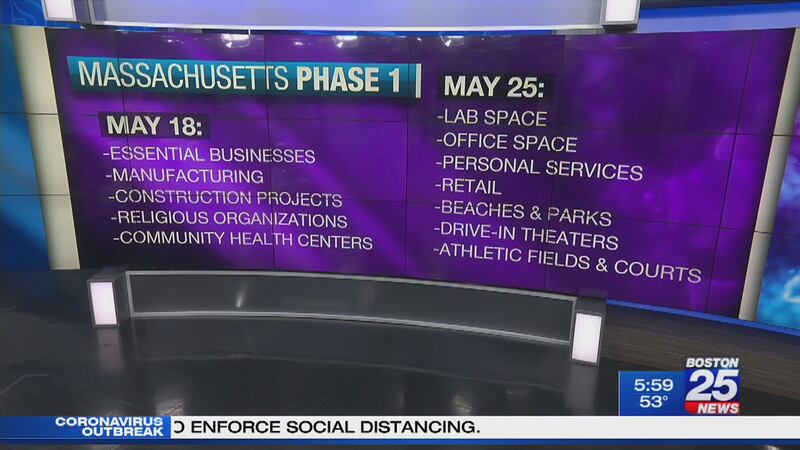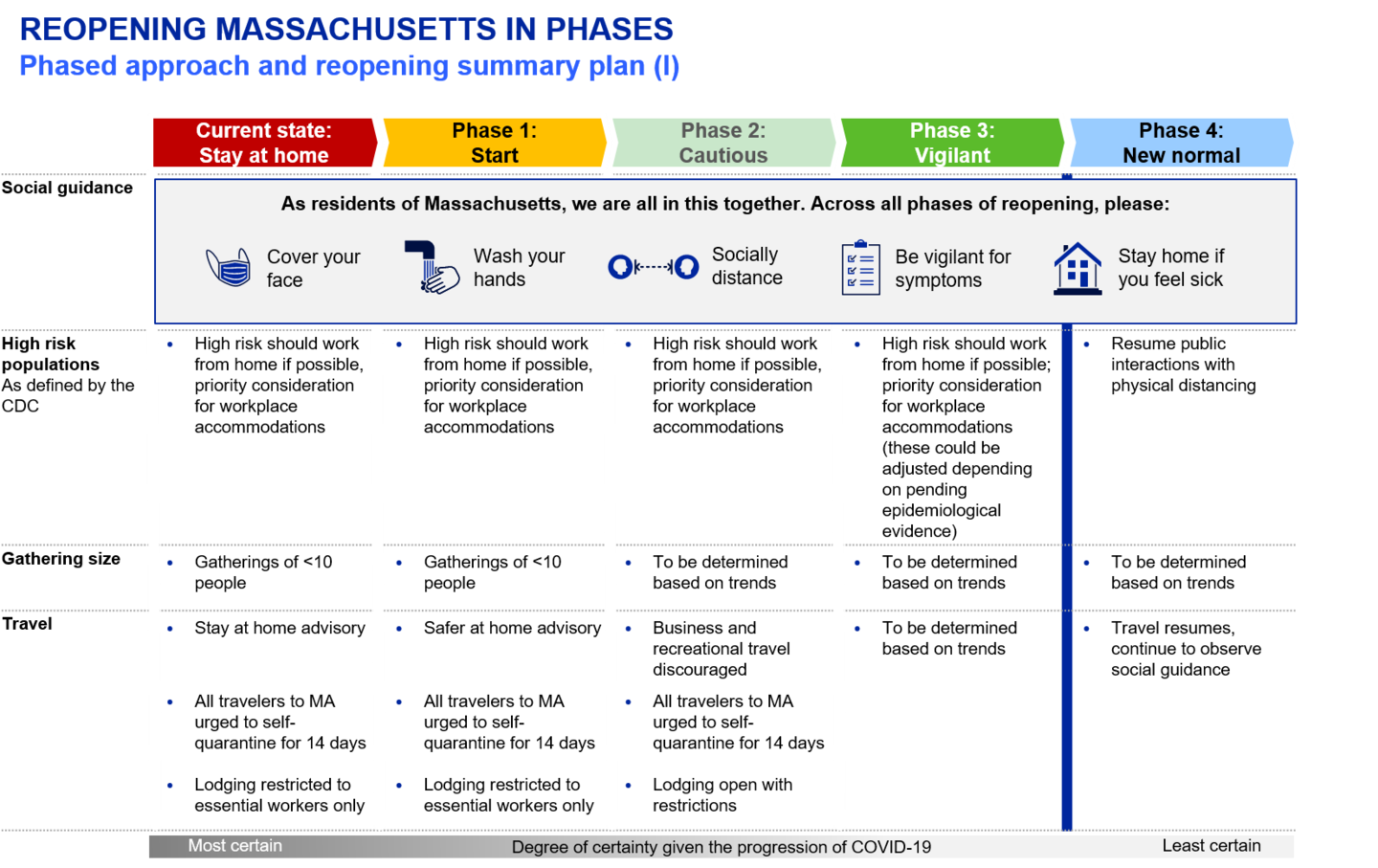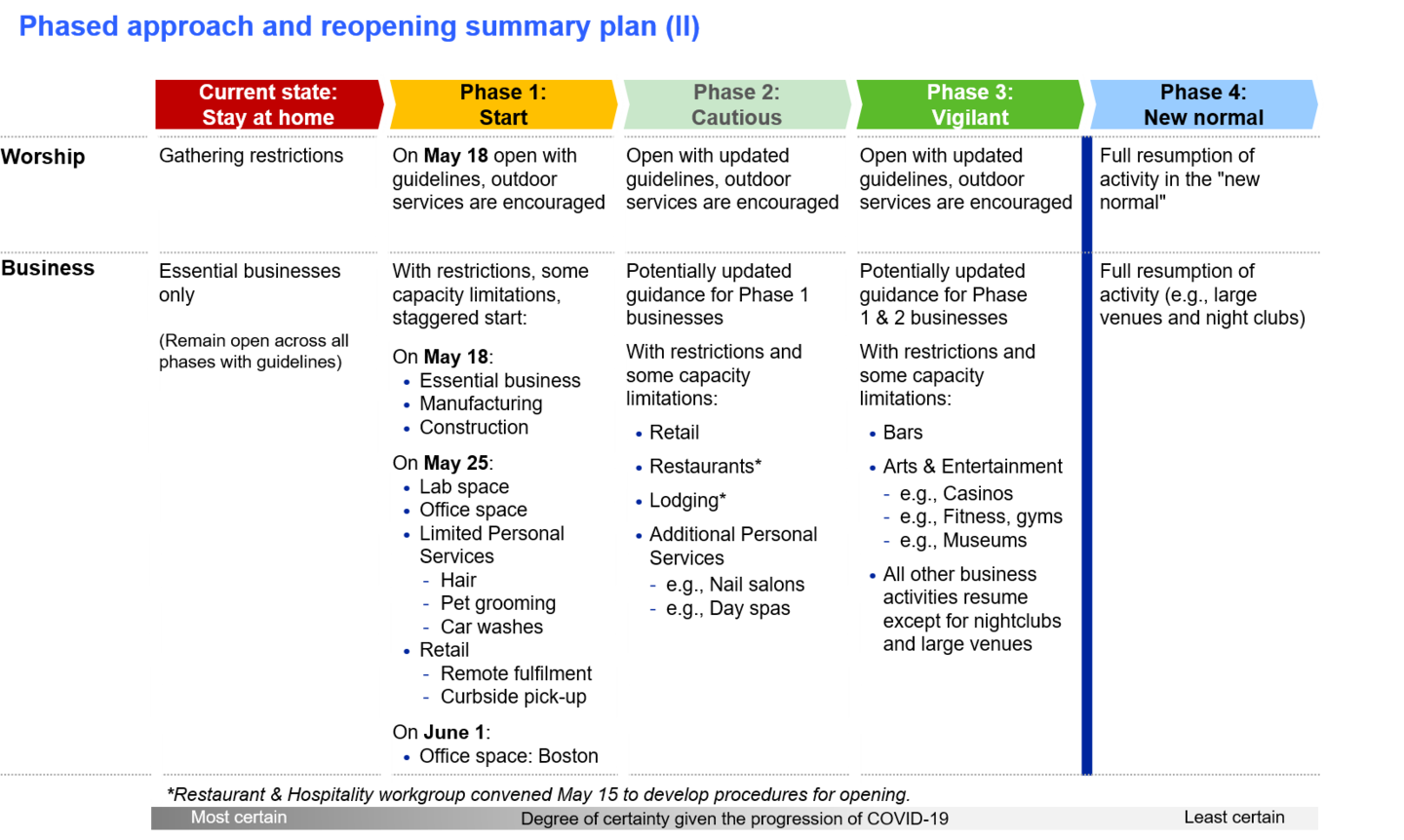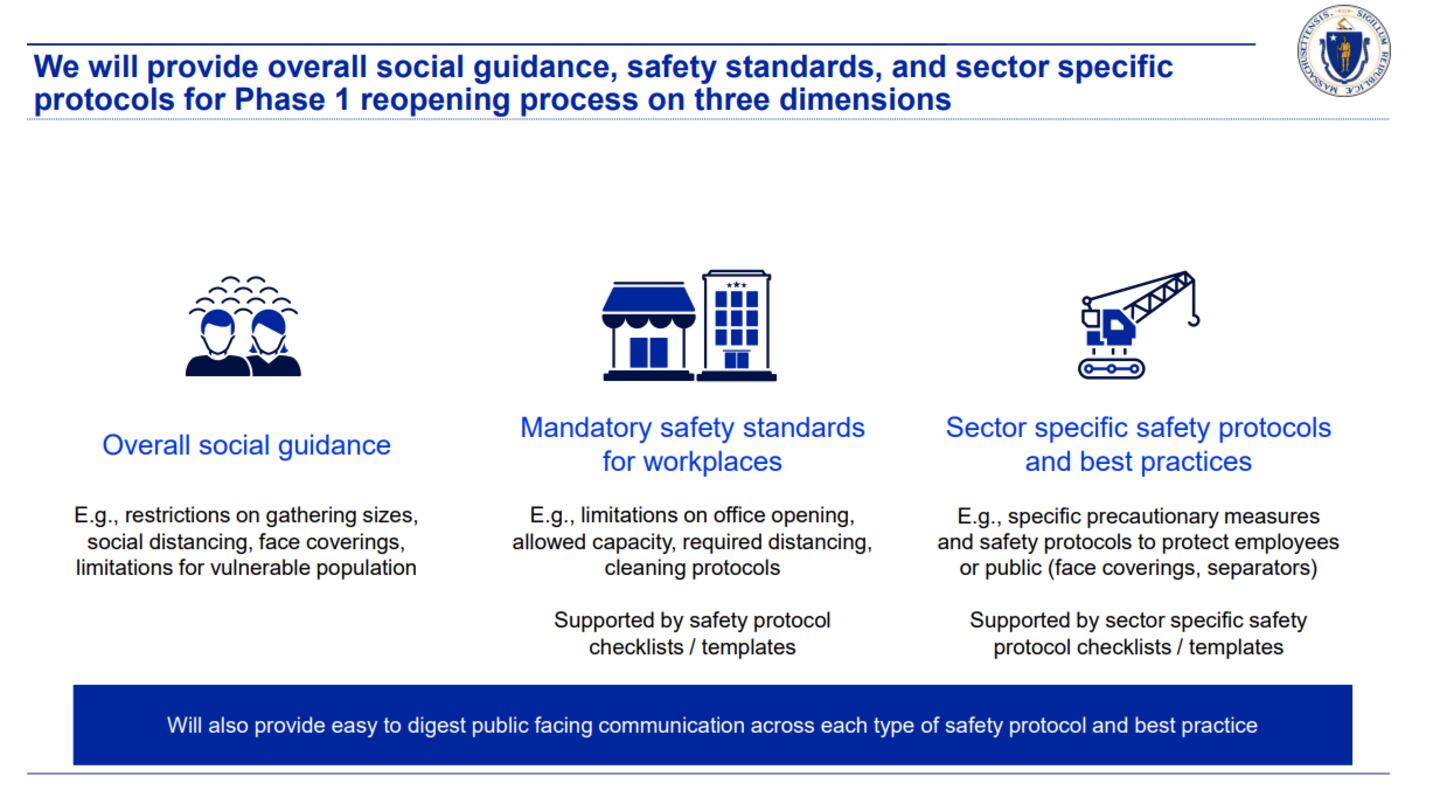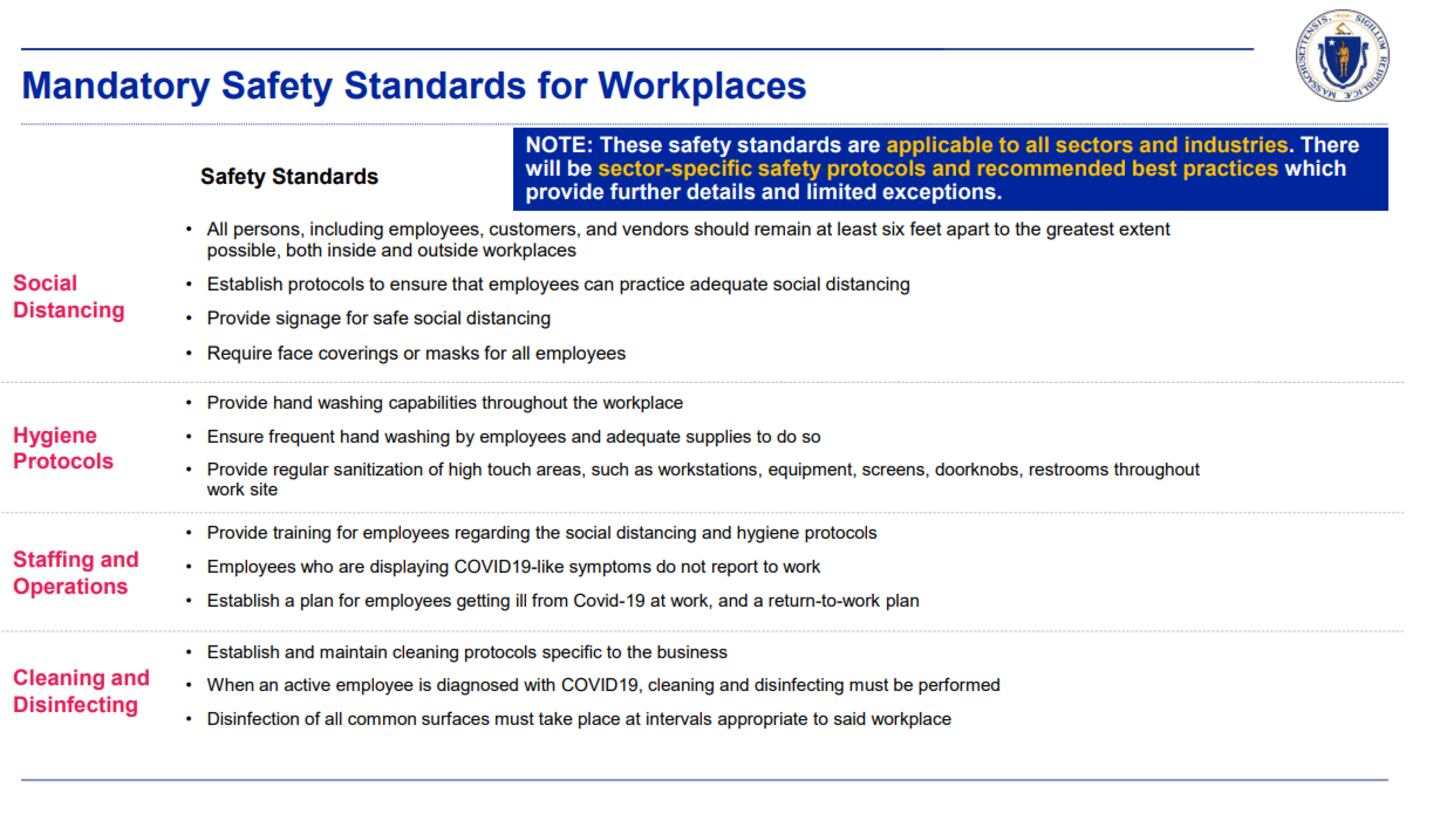BOSTON — Massachusetts finally has guidance on how and when businesses can start to reopen across the Commonwealth.
Governor Charlie Baker’s four-phase plan began to take on more details Monday morning as his COVID team, led by Lt. Gov. Karyn Polito, delivered its report on how businesses could begin operating under new guidelines.
Safer At Home
First and foremost, Baker downgraded the state’s stay-at-home advisory to a ‘safer at home’ advisory. The language is meant to encourage residents to stay home as much as possible and to encourage businesses to continue allowing employees to work from home where possible. Importantly, Baker said his 10 persons or fewer gathering restriction will remain in place during phase one, which officially began Monday.
The reopening phases will start with a small number of industries, including manufacturing, construction and religious institutions, reopening with restrictions.
The overview steps are outlined below:
- Phase 1 - Start: Limited industries resume operations with severe restrictions
- Phase 2 - Cautious: Additional industries resume operations with restrictions and capacity limits
- Phase 3 - Vigilant: Additional industries resume operations with guidance
- Phase 4 - New Normal: Development of vaccine and/or therapy enables resumption of ‘new normal’
Each industry will be required to comply with safety regulations and guidelines before it is allowed to open, however, Baker says the restrictions will be self-enforced. Businesses will have a week to bring themselves into compliance with the new regulations.
Moving between the phases will depend entirely on health data. Baker said if numbers of infections, hospitalizations or deaths rise, then the phases could be reversed.
Gov. Baker said flexibility is key.
“We have to be flexible and honest that the timing and the details of these phases could change depending on the track the virus takes as we go forward,” Baker said Monday. “If public health metrics indicate that a particular sector or industry is unexpectedly susceptible to spread, then that specific industry’s reopening may be delayed to a later date.”
Baker said all four phases to reopen will last approximately three weeks, but could last longer depending on what the health data reveals.
PHASE 1: Start
May 18
According to the announcement made Monday, essential businesses can continue to operate while manufacturing businesses, construction projects and religious organizations will be allowed to begin preparing for operation. They will have a week to meet new operating guidelines.
May 25
The following week, on May 25, a significant portion of businesses will be allowed to begin the process of reopening under phase 1.
- Laboratory and life science facilities
- Offices, excluding City of Boston: work from home strongly encouraged, businesses should restrict workforce presence to <25% capacity
- Hair salons and barbershops: by appointment only
- Pet grooming: by appointment only
- Car washes: exterior washing allowed
- Recreation and outdoor: with guidelines
- Other health care providers: who attest to specific public health/safety standards can provide high priority preventative care, pediatric care and treatment for high-risk patients
- Retail: remote fulfillment and curbside pickup, including recreational marijuana.
Beaches, parks, drive-in theaters, some athletic fields and zoos will all be allowed to reopen with restrictions starting Monday, May 25.
You can find a complete list of the opening phases on the state’s website.
PHASE 2: Cautious
Under Phase 2, the following businesses will be able to reopen:
- Restaurants: Can begin to open dining areas
- Retail: Browsing in-store
- Libraries to browsing inside
- Casino hotels & restaurants
- Driving school behind-the-wheel training
- Hotels: Reopen to serve other guests with restrictions
- Personal services: Nail salons, day spas, massage therapy, tattoo parlors
- Outdoor recreation: Miniature golf, go-karts, batting cages
- Youth sports
- Recreational day camps
PHASE 3: Vigilant
For Phase 3 of Baker’s reopening plan, the following businesses can reopen:
- Bars: Bars are defined as establishments that only serve alcohol and do not have kitchen areas that prepare food on-site.
- Gyms
- Casino gaming areas
- Movie theaters
- Museums
- Performance venues: Such as concert halls, theaters
- Sightseeing: Bus tours, duck boats, harbor cruises, whale watching
- Tours
- Indoor recreation: Indoor batting cages, indoor go-karts
“These last couple months have obviously been painful and difficult and frustrating for us all,” said Gov. Baker. “But we are seeing positive signs that the work everybody has done has been paying off and that makes it possible for us to be serious about a phased reopening.”
PHASE 4: The New Normal
When we hit Phase 4, the following will reopen:
- Large venues: Arenas, stadiums, night clubs, race tracks, sports venues
Boston Mayor Marty Walsh released a statement Monday afternoon on Baker’s reopening plan:
“The framework released today can serve as a guide for a cautious, phased-in approach to reopening the economy, driven by clear public health criteria and safety guidelines that will keep our residents and workers healthy, and the Commonwealth moving in the right direction.
“What needs to be made clear is that reopening does not mean back to normal, and normal is not what we should be striving for. It means bringing safety and caution into our economy and community life. It means continuing to meet the needs of our families, seniors, front-line workers and vulnerable people, because reopening the economy does not erase the hurt that continues to be felt by so many in our city who have been impacted by this crisis. It means working collectively, for however long it may take, to recover the health and strength of our city and its people.
“We must stay focused on what got us this far: physical distancing, covering our faces when out in public, washing our hands and cleaning surfaces. We should continue to limit trips outside the home, especially for people over 65 or with underlying health conditions. Beginning to reopen the economy does not mean the risk of contracting the virus is gone. The fastest and most sustainable way out of this situation is the healthy way, and we simply can’t afford unnecessary setbacks.
“The City of Boston plays a unique role in the Commonwealth, as the capital city, economic engine, and hub of social services. Since the beginning, we have worked to make this a broad and inclusive conversation with a focus on equity, understanding the disproportionate health and economic impacts this pandemic has had on some of our residents. We will continue to work in collaboration with the state as this plan unfolds and in Boston we will always make decisions that are based on data and the needs of our diverse residents and workers.”
Walsh will hold a press briefing on Tuesday, May 19 at 12:30 p.m. to further discuss reopening plans for Boston.
Boston 25 News will carry this live on air and online.
Mandatory Safety Standards for Workplaces
Baker released safety standards for workplaces in regards to:
Social Distancing:
- All persons, including employees, customers, and vendors should remain at least six feet apart to the greatest extent possible, both inside and outside workplaces
- Establish protocols to ensure that employees can practice adequate social distancing
- Provide signage for safe social distancing
- Require face coverings or masks for all employees
Hygiene Protocols:
- Provide hand washing capabilities throughout the workplace
- Ensure frequent hand-washing by employees and adequate supplies to do so
- Provide regular sanitation of high touch areas, such as workstations, equipment, screens, doorknobs, restrooms throughout work site
Staffing and Operations:
- Provide training for employees regarding the social distancing and hygiene protocols
- Employees who are displaying COVID19-like symptoms do not report to work
- Establish a plan for employees getting ill from COVID-19 at work, and a return-to-work plan
Cleaning and Disinfecting:
- Establish and maintain cleaning protocols specific to the business
- When an active employee is diagnosed with COVID19, cleaning and disinfecting must be performed
- Disinfection of all common surfaces must take place at intervals appropriate to said workplace
Guidance for towns and cities on enforcing new COVID-19 guidelines
Slowing the spread of COVID-19 requires the cooperation of all of us. The plan to re-open the economy safely requires that everyone do their part, and we expect most people will be diligent about keeping themselves and their neighbors safe and healthy.
Permitted Activities
Phase 1 of the re-opening plan keeps in place existing restrictions, advisories and guidance but provides exceptions for certain activities that can resume safely.
What Can Individuals Do?
- A new “stay safer at home” advisory requests that individuals stay at home when they can. The safer at home advisory is not enforceable. However, all individuals are required to wear a face covering in most places when outside of the home. The requirement to wear a face covering is enforceable by the local board of health.
- All individuals remain subject to the existing order limiting gatherings to no more than 10 persons, except in unconfined outdoor spaces. The restriction on gathering size is enforceable by the local board of health. This limitation does not apply to workplaces authorized to operate, but more specific capacity and meeting rules will apply.
- Compliance with the mandatory rules outlined above is enforceable by the local board of health through the issuance of civil fines of up to $300 per violation.
What Can Businesses Do?
- Essential services have been allowed to operate prior to first phase or reopening. Currently operating businesses must come into compliance with new workplace safety standards by May 25.
- In addition, essential businesses already operating must self-certify and comply with applicable standards by May 25 or July 1, manufacturing, construction, retail curbside pickup only, places of worship (40% occupancy limit), firearms retailers and shooting ranges, will be permitted to resume operations on May 18. No business is required to re-open and may not reopen until it is ready.
- All operating businesses must comply with general mandatory workplace safety standards, as well as sector-specific workplace standards and protocols where applicable. Note that some specific sector and workplace standards and protocols are mandatory (actions that “must” be taken), while others are best practice guidance (actions that “should” be taken).
Enforcement of Workplace Safety Standards
- Only essential services and businesses specifically designated for reopening can operate in phase 1. In order to open or continue operation, all businesses must:
- Develop a written COVID-19 safety plan outlining how will prevent the spread of COVID-19.
- Self-certify that it will operate in compliance with all applicable and mandatory workplace safety standards. Templates are available here.
- Produce this self-certification, if requested, by the local board of health, DLS or DPH. Failure or refusal to produce the self-certification upon request is grounds for enforcement action.
- Workplace safety standards are enforced jointly by the local boards of health and DLS. Enforcement can be initiated by either the local board of health or DLS, whichever entity is called in first by a person filing a complaint. DLS and each municipal authority shall uniformly apply any enforceable COVID-19 workplace safety rule.
- Local boards of health and DPH retain all authority they have under current public laws to regulate and inspect under chapters of the State Sanitary Code. Cities and towns should not adopt stricter rules or ordinances that are intended to address the risks of COVID-19.
Escalating Enforcement
- DLS and local boards of health are not required to undertake inspections of businesses that are reopening. It is expected that most enforcement actions will be initiated by a complaint from a customer or employee.
- The goal of enforcement should be to educate and promote compliance. Enforcement escalation for any particular business should follow the escalation grid below. Upon issuance of each escalation measure, the enforcement authority should allow for at least 24 hours for the business to make necessary changes prior to a subsequent inspection.
Verbal consultation & redirection
Up to 1 time before escalation to next level
Written redirection
Up to 1 time before escalation to next level
Fines up to $300
Up to 3 times before escalation to next level
Cease & Desist letter
Up to 1 time
- Enforcement actions taken by DLS will be communicated to the local board of health. Enforcement actions taken by a board of health should be communicated to DLS.
- Neither DLS nor the local board of health has authority to close a business for violation of a COVID-19 workplace safety standard. They may revoke a permit or close a business pursuant to other regulations or local ordinances. Where continued non-compliance with a COVID-19 workplace safety standard warrants the closing of a business, the local board of health or DLS must first seek a court injunction.
- DLS and local boards of health may request the assistance of state and local law enforcement authorities when needed. It is expected that police presence will be limited and will be required only when a compliance issue presents an immediate threat to health and safety or the risk of a violent confrontation.
- Local boards of health can request enforcement assistance and interpretive guidance can be by calling the DLS hotline: (508) 616-0461 x9488 or by sending an email to safepublicworkplacemailbox@mass.gov.
Download the free Boston 25 News app for up-to-the-minute push alerts
>> Complete local and national coronavirus coverage here
RESOURCES:
- Massachusetts Coronavirus Information
- Boston Coronavirus Information
- Follow us on Facebook and Twitter | Watch Boston 25 NOW

